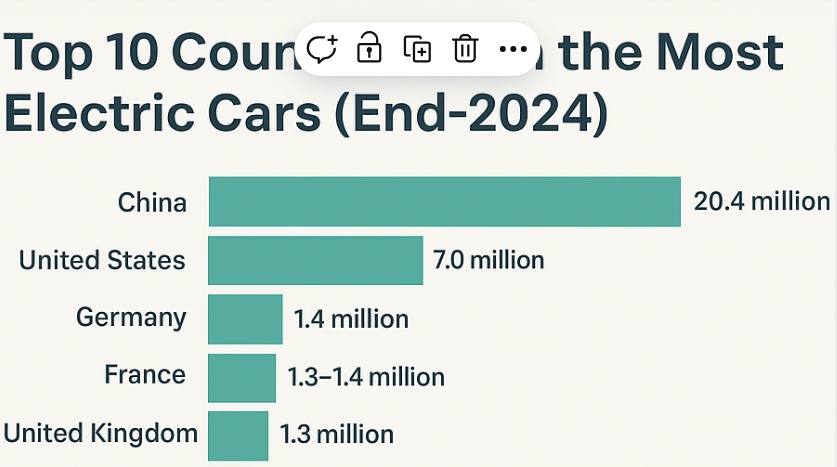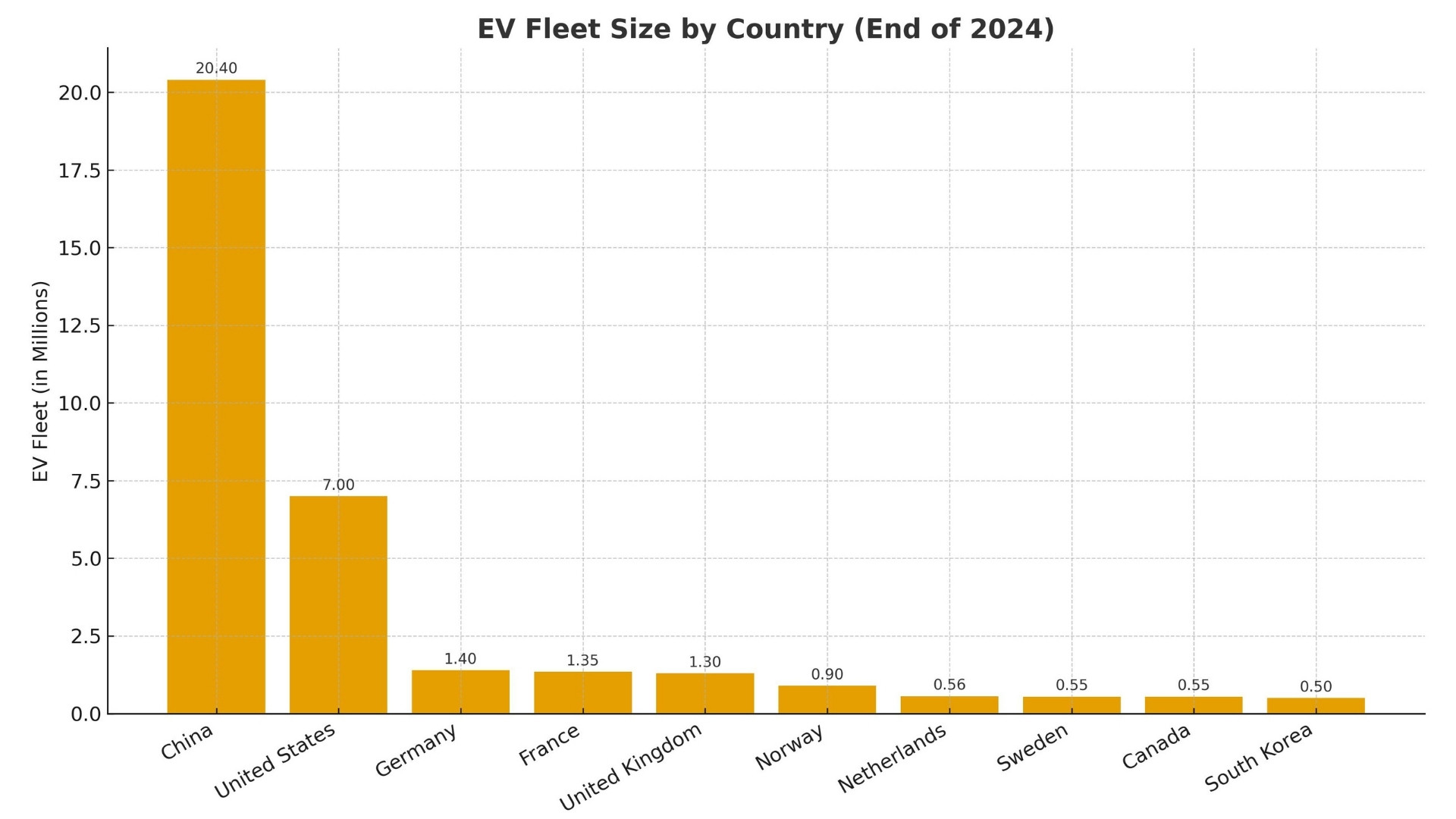Key Points
- China and the US lead globally with the largest EV fleets, followed by Germany and France.
- Emerging EV markets shows rapid growth backed by policy incentives & rising production.
- Europe shows strong momentum dominating per capita adoption.
According to the IEA Global EV Outlook 2025, from massive fleets in Asia to record-breaking sales in Europe and North America, electric cars are reshaping the future of mobility. For the United States as well, the rise of EVs is closely tied to tax credits, Tesla’s dominance, and new federal infrastructure plans. This article lists the Top 10 countries with the most electric cars in 2025, explaining their growth, policies, and innovations driving adoption.

List of Top 10 Countries with the Most Electric Cars (End-2024)
The list below shows the 10 countries with the most electric car fleets and sales at the end of 2024:
| Rank | Country | Approx. EV Fleet (BEV + PHEV) |
| 1 | China | 20.4 million |
| 2 | United States | 7.0 million |
| 3 | Germany | 1.4 million |
| 4 | France | 1.3–1.4 million |
| 5 | United Kingdom | 1.3 million |
| 6 | Norway | 0.9 million |
| 7 | Netherlands | 0.56 million |
| 8 | Sweden | 0.55 million |
| 9 | Canada | 0.55 million |
| 10 | South Korea | 0.5 million |
Source: Countries by electric-car fleet (BEV + PHEV) as of end-2024, IEA Global EV Outlook 2025
Check Out: Future of Automobile Industry of India
-1756140003922.jpg)
(Disclaimer: Figures are rounded, based on IEA Global EV Outlook 2025 and its public dataset via Our World in Data.) Here are the top 10 countries that rank in the electric-car fleet according to the IEA Global EV Outlook:

(Note: Bar Graph Showing EV Fleet Size by Country at the End of 2024)
EV Trends & Forecast (2026–2030)
New policies are coming up with infrastructure expansion and manufacturing investments in the next five years that will define the speed of global transition to electric vehicle adoption:
-
Europe: According to the UK government, the EU has legislated a ban on new petrol/diesel car sales by 2035, and the UK will follow suit by 2030.
-
United States: Forecasts range from 26.4 million to 27 million EVs by 2030, with a build-out of tax incentives and charging networks fueling demand, as per SEPA.
-
China: The EV share of new car sales is projected to reach 80% by 2030, maintaining its global leadership in EV adoption.
-
Norway: With 88.9% of new car sales already electric in 2024, the country is likely to hit 100% EV sales by 2025, as per Green Car Stocks.
What are the Emerging Markets Gaining Traction?
Few markets are consistently rising in their Electric Vehicle adoption. To name a few, the following are:
-
India: According to JMK Research & Analytics, EV penetration is poised to climb with 30% for private cars, 70% for commercial vehicles, and 80% for two/three-wheelers by 2030. Moreover, annual EV sales might reach 17 million.
-
Brazil: EV count is expected to grow to 300,000 by 2029, and maybe 500,000 by 2034, backed by strong market growth, as perGrand View Research.
-
Southeast Asia: Nations like Thailand, Indonesia, Malaysia, and Vietnam are positioning themselves as regional EV production hubs by 2030, with rapidly rising adoption figures, as per BloombergNEF.
The Top Countries are listed below for the most EV Market Share by Country:
1. China
China leads the world in electric cars, with a fleet of over 20 million BEVs and PHEVs as of 2024. In 2024 alone, it sold around 11 million electric cars, as reported by IEA.
2. United States
The US holds the second-largest EV fleet, at approximately 7 million plug-in cars. In 2024, about 1.6 million EVs were sold. Moreover, new tax incentives under the Inflation Reduction Act and more affordable models continue to support demand.
3. Germany
After the United States, Germany is the largest EV market in Europe, which is home to about 1.4 million BEVs and PHEVs. Apart from this, it recorded over 500,000 new battery-electric registrations in 2023.
4. France
France comes after Germany in Europe’s EV market, which also boasts a large fleet of plug-in vehicles with over 790,000 since 2010. Along with it, charging infrastructure investments and a pledge to phase out fossil fuel car sales by 2040 are also promised.
5. United Kingdom
The UK features in the top five, with an estimated 1.3 million EVs on the road. As reported by IEA, roughly 25% of new car sales are electric.
6. Norway
Though small in population, Norway leads globally in per capita with around 900,000 EVs. In 2024, an astonishing almost 95% of new car sales were electric.
7. Netherlands
The Netherlands rounds out the high adopters with roughly 560,000 EVs. In 2023, around 30% of new cars sold were electric, reflecting progress toward greener transport through subsidies and infrastructure.
8. Sweden
After the Netherlands, Sweden's EV fleet stands at about 550,000 vehicles with a striking 39.8% of new car sales being electric in late 2023. The country also benefits from strong incentives and escalating public interest in EVs as sustainable transport choices.
9. Canada
Canada is nearing 550,000 EVs, with electric vehicles making nearly 9.4% of new car sales by early 2023.
Check Out: List of 9 Poorest Countries in Asia by GDP PPP, Check Economic Challenges!
10. South Korea
South Korea completes the top ten, approaching 500,000 plug-in vehicles which means there is a vast room for growth, especially with strong local players planning major EV rollouts.
Conclusion
Therefore, this shows that the electric vehicles have stepped into the fast lane globally and are led by China. All these are supported by a mix of incentives, innovation, and infrastructure. Markets like Sweden show how policy can turbo-charge adoption, while others still have plenty of room to catch up. Norway ranks highly due to its world-leading per-capita EV penetration. Along with this, Canada and South Korea round out the top 10, both around the half-million mark. Germany, France, and the UK rank between 3rd and 5th position, which are close in fleet size, with each around 1.3–1.4 million plug-in cars. To see more of such stories, you can go ahead and add this site to your preferred sources by clicking here.
Comments
All Comments (0)
Join the conversation